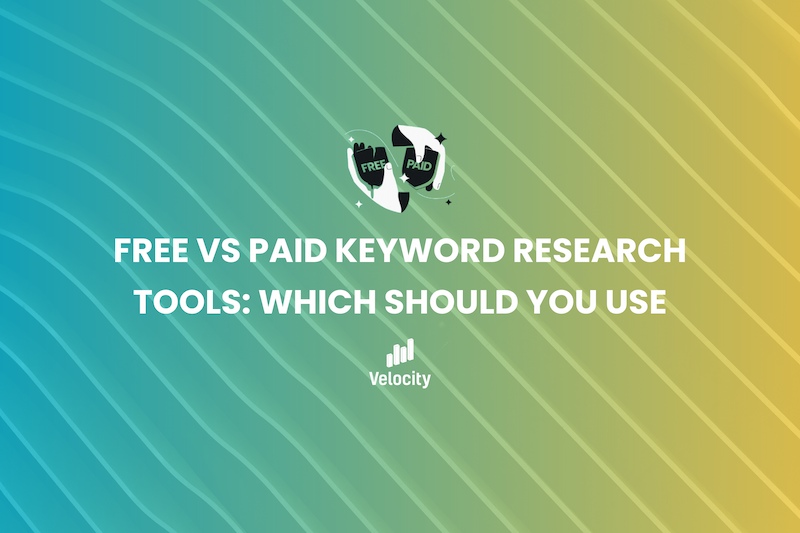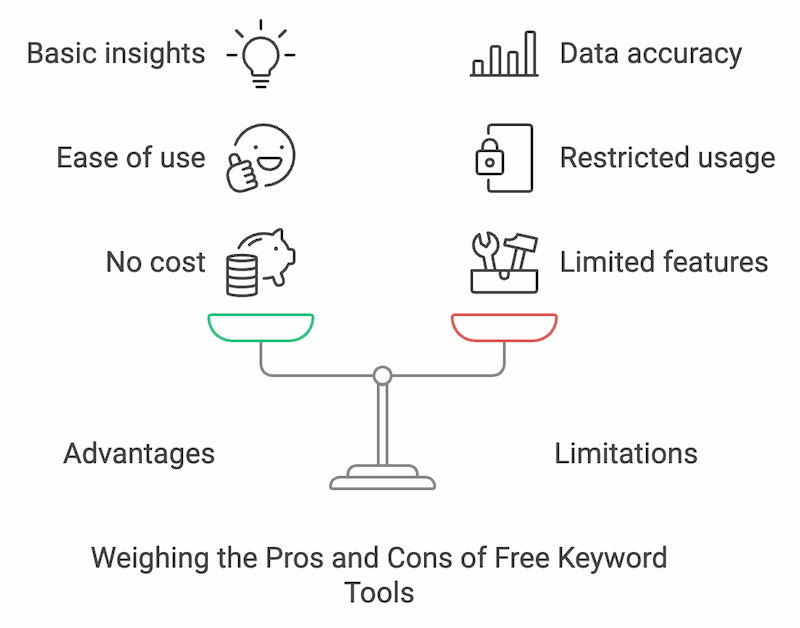Free vs Paid Keyword Research Tools: Which Should You Use in 2025?

For search marketing, the right keywords can make or break your campaign. Whether you’re a seasoned SEM pro or an intern just dipping your toes into the vast ocean of Google Ads, you’ve likely asked yourself this: Should I rely on free keyword tools, or is it worth investing in paid ones?
Having worked on countless campaigns over the years, we’ve had our fair share of experience with both free and paid keyword research tools. Let us walk you through the pros, cons and our personal experiences to help you make an informed choice.
What Are Keyword Research Tools and Why Do They Matter?

Before diving into the debate, let’s get one thing straight—keyword research tools can be your secret weapon for finding the terms and phrases your potential customers are searching for. The better your keywords align with user intent, the better your chances of driving traffic, generating leads, and ultimately, growing your business.
There are two primary types of tools: free keyword tools and paid keyword tools. Each has its unique perks, but the real question is: which one aligns with your needs?
The Case for Free Keyword Tools
Let’s start with the budget-friendly option: free keyword research tools. These are perfect for businesses with tight budgets or those just starting out.
Advantages of Free Keyword Tools
- No Cost Involved: Who doesn’t love free stuff? Tools like Google Keyword Planner and Ubersuggest provide a wealth of data without costing a dime.
- Ease of Use: Most free tools are straightforward and beginner-friendly, making them an excellent choice for anyone new to keyword research.
- Basic Insights: They deliver essential metrics like search volume, competition level, and sometimes even keyword suggestions, helping you lay a solid foundation for your campaigns.
Limitations of Free Keyword Tools
While free tools can be helpful, they often come with strings attached:
- Limited Features: Free tools lack the advanced features of their paid counterparts, such as competitor analysis and trend predictions.
- Data Accuracy: The data provided can sometimes be outdated or less comprehensive, leading to missed opportunities.
- Restricted Usage: Some free tools have daily limits or restrict access to premium features unless you upgrade.
The Power of Paid Keyword Tools
Paid keyword research tools like SEMrush, Ahrefs, and Moz take keyword analysis to the next level. But are they worth the price tag?
Advantages of Paid Keyword Tools
- Comprehensive Data: Paid tools provide advanced metrics, including competitive analysis, keyword difficulty scores, and SERP features.
- Time-Saving Features: Automations, detailed reports, and integrated workflows make research more efficient.
- Competitor Insights: Want to know which keywords your competitors are ranking for? Paid tools lay it all out for you.
- Tailored Suggestions: Tools like Ahrefs and SEMrush can generate personalized keyword suggestions based on your niche, ensuring your campaigns stay ahead of the curve.
Limitations of Paid Keyword Tools
Despite their many advantages, paid tools come with a few downsides:
- Cost: Subscriptions can range from $99/month to over $400/month, which may be steep for small businesses.
- Learning Curve: Advanced tools often come with complex features, requiring time and effort to master.
Google Keyword Planner vs SEMrush: A Quick Comparison
| Feature | Google Keyword Planner | SEMrush |
|---|---|---|
| Cost | Free | Starts at $119.95/month |
| Ease of Use | Beginner-friendly | Advanced, requires learning |
| Data Depth | Basic insights | Comprehensive |
| Competitor Analysis | Limited | Advanced |
| Trend Analysis | Limited | In-depth and actionable |
If you’re new to keyword research or running a small-scale campaign, Google Keyword Planner is a solid starting point for exploring keyword research tips. For larger campaigns or highly competitive industries, SEMrush is worth considering.
How to Decide: Free vs Paid Keyword Research Tools

The choice ultimately boils down to your goals and budget. Here’s a quick guide:
- Go with Free Tools If:
- You’re just starting out or testing Google Ads for the first time.
- Your budget is tight.
- You only need basic keyword insights.
- Invest in Paid Tools If:
- You’re running large-scale campaigns and need advanced analytics.
- Competitor research is critical to your strategy.
- You want to save time while gaining deeper insights.
Our Personal Recommendation
If you’re serious about scaling your campaigns, a hybrid approach works best. Start with free tools to gather initial data, then transition to paid tools as your campaigns or client list grow. Think of it like upgrading from a bicycle to a car—it’s all about what you need for the journey ahead.
Conclusion
Choosing between free vs paid keyword research tools doesn’t have to be overwhelming. By understanding your business goals, budget, and campaign complexity, you can make a decision that sets you up for success. Remember, the right tool isn’t about how much it costs—it’s about how well it helps you achieve your objectives.
Still unsure? Start with a free tool like Google Keyword Planner, explore a trial of a paid option like SEMrush, or hire a Google Ads agency. Experiment, analyze, and see what works best for you.
